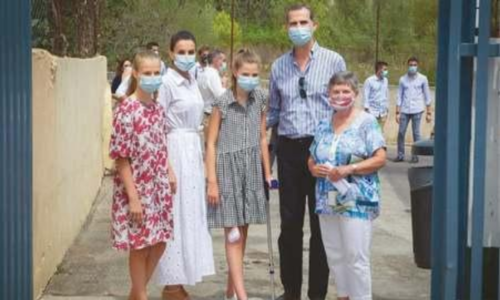BARCELONA: After spending 48 days with Covid-19 in an intensive care unit in Barcelona, Ibrar Ahmed Iftikhar looked pleased to finally be out in the open.
On the Spanish city’s seaside promenade his family, who had not seen him since he was admitted to hospital, greeted him with kisses, hugs and caresses.
The 52-year-old, who moved to Spain from Pakistan three decades ago, has a tube in his neck allowing him to breathe — but preventing him from speaking.
He responds to affection instead with smiles and moving his lips to try to pronounce words.
His wife holds his hand, while his brother and sister caress his face. His 18-year-old son Hussnain does not leave his side, carefully adjusting the bedsheets when the Mediterranean breeze cools the air.
“I have never been apart from my father for so long. We get along really well, we have a good connection and not seeing or talking to him for so many days has been hard,” he said.
“We were waiting for a call from the doctor 24/7, seven days a week, to see what they said. My father has a very large family and we were all watching out for news.”
Iftikhar was also able to see his sisters, mother and other relatives by video over a smartphone. He waved to them as they spoke.
The large white bed is surrounded by healthcare workers from the Hospital del Mar — the Hospital of the Sea — wearing white and green gowns.
The scene draws the attention of passers-by on the promenade which before the pandemic would have been packed with tourists.
The seaside reunion is part of a programme launched by the hospital to try to “humanise” ICU stays and “include the physical and emotional wellbeing of the patients,” Judith Marin, an intensive care doctor with the hospital, said.
To take part in one of these outings, a patient must first test negative for Covid-19 and have made significant progress in their recovery.
Patients are monitored while outside and emergency resuscitation equipment is on hand in case it is needed.
The project was launched before the arrival of the coronavirus but the pandemic has made it even more necessary because of the strict isolation protocols Covid-19 patients must endure.
The hospital wants to expand the programme in the future to allow pets to visit patients in the ICU unit.
Published in Dawn, March 7th, 2021














































